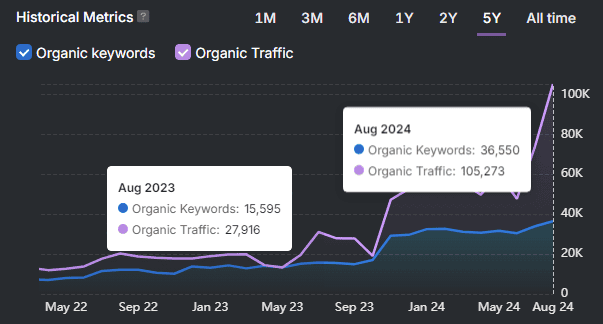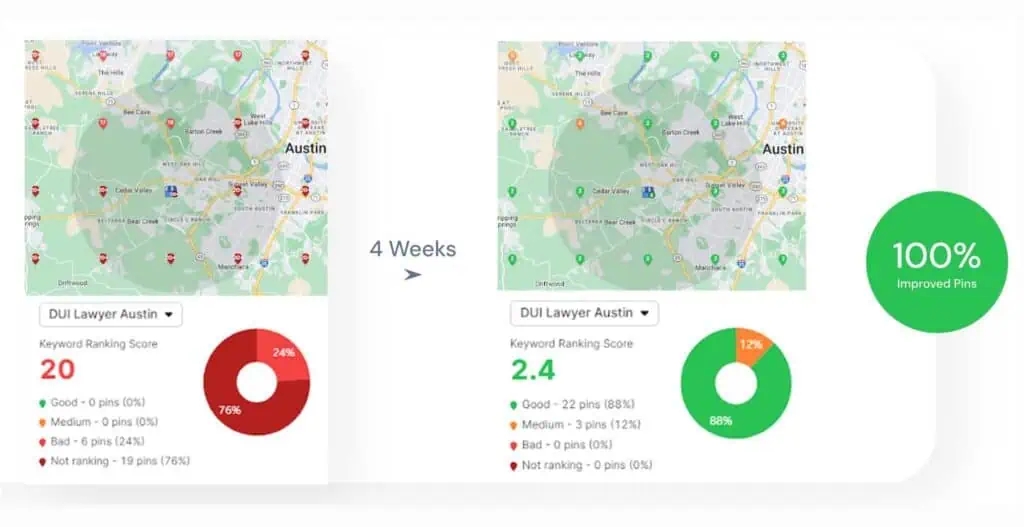Great SEO doesn’t start with one keyword—it starts with hundreds.
Bulk keyword research lets you spot trends, uncover gaps, and build content strategies that scale.
But what exactly is it, and how do you do it without losing hours to spreadsheets? 🤔
This article unpacks the concept in simple terms and highlights 5 of the best keyword research tools to help you analyze keywords at scale.
We’ll show you how to find high-potential keywords quickly and use them to drive real results. If you’re ready to level up your SEO game, this is the place to start.
What Is Bulk Keyword Research?
Bulk keyword research is the process of finding and analyzing a large number of keywords all at once, rather than searching for them one by one.
Instead of guessing what terms your audience might use, bulk research gives you a wide-angle view of what people are actually searching for across your niche. This helps you uncover content gaps, spot trends, and prioritize high-value keywords based on difficulty, volume, and intent.
SEO professionals, content marketers, digital agencies, and bloggers often rely on bulk keyword research when planning content calendars, launching new campaigns, or auditing existing pages.

Why Is Bulk Keyword Research Important?
When you’re planning content, managing SEO, or launching a campaign, bulk keyword research makes things simpler and more strategic. Instead of digging through keywords one by one, you get a full view of what’s worth targeting—all at once.
Here’s why that matters:
- Saves serious time: You can pull hundreds of keywords in one go. For example, instead of manually researching product-related terms, a clothing brand can instantly find search queries for every type of jacket, style, and season in one list.
- Helps you focus on what matters: With filters for search volume, difficulty, or cost, you can sort through the noise and zero in on terms that actually support your goals, whether that’s traffic, conversions, or visibility.
- Makes content planning smoother: When you’ve got a list of related keywords grouped by topic or intent, building out blog posts, landing pages, or product descriptions gets way easier.
- Supports growth at scale: If you manage a lot of content or clients, bulk research lets you spot trending keywords and prioritize ideas quickly without losing quality.
In short, it gives you the clarity to make smart, data-backed decisions without getting buried in busywork.
How to Do Bulk Keyword Research the Smart Way
Good SEO starts with more than just finding keywords—it’s about understanding how people search and making sense of all the data behind those searches.
To do this well, you’ll need to:
- Start with a big list of keyword ideas.
- Use filters to narrow it down.
- Check how competitive each keyword is.
- Group keywords in a way that fits your goals.
Let’s go through each step in more detail.
1. Brainstorm a Big List of Keywords
The first step is building a long list of keyword ideas. This is your foundation. Tools like Search Atlas Keyword Magic help marketers come up with a wide range of keywords, from the most popular to the more specific ones used in niche markets.
This phase blends creativity with strategy. You look at:
- Basic (or “seed”) keywords.
- What your competitors are ranking for.
- Current trends in your industry.
The goal is to create a list that’s both broad and insightful, giving you lots of good material for your SEO and content strategies.
2. Narrow It Down with Filters
Once you’ve got your big list, it’s time to refine it. 👉
You can filter by:
- Search volume: Find terms people are actually looking for.
- Cost: Find affordable options, especially if you’re planning paid campaigns.
- Competitive Pressure: Exclude terms that are too difficult to rank for.
- Relevance: Make sure the keywords fit your content and audience (you need to think about this and look at user intent, which is also shown in most newer tools).
- Terms: Exclude terms like brand names or include specific words.
This step helps you zero in on the high-value keywords that are most likely to bring in quality traffic.
3. Check Keyword Competitiveness
Next, you’ll want to see how hard it is to rank for each keyword. Search Atlas makes it easy to check which keywords are highly competitive and which ones are more achievable.
Its advanced analytics show you how tough the competition is for each term, so you can make smarter decisions. You might go after easier wins first, or decide where it’s worth investing more time and resources.
This helps you build an SEO strategy that mixes quick wins with long-term goals.
4. Group Keywords for Better Results
Bulk keyword research isn’t just about collecting words—it’s about organizing them in a way that helps you target your audience better.
Search Atlas helps you group related keywords into themes or clusters. That way, you can:
- Create content that’s more relevant to what people are searching for.
- Track performance more accurately.
- And align your SEO with your marketing goals.
By grouping keywords strategically, you create a clearer, more effective content plan that meets both keyword intent and business needs.
5. Do All This in One Click with AI
AI tools give you a way to do bulk keyword research, analysis, and clustering simultaneously. Agencies that research keywords in bulk to create content plans can do this with Content Planner.
This is how it works.
First, you enter a broad, seed keyword. Then you get hundreds of topics and keyword clusters in minutes.
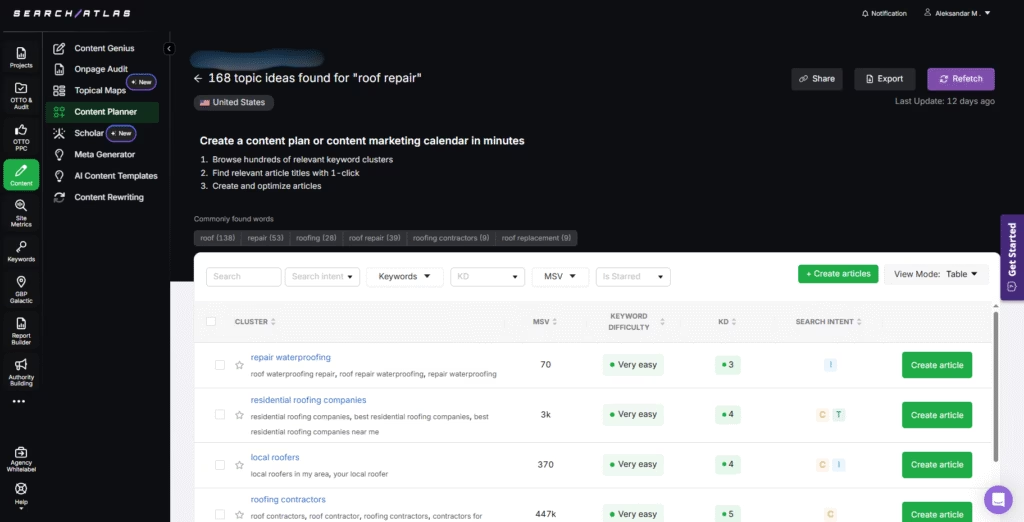
After that, look at each cluster’s total monthly search volume, traffic potential, and other metrics, and choose if you want to use it for a topic.
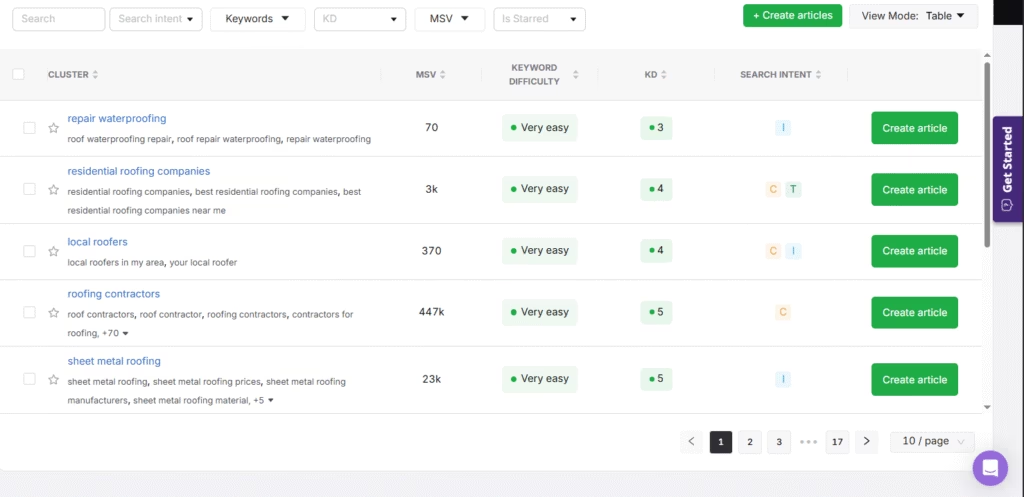
For more details, also see the metrics for each cluster and keyword individually.
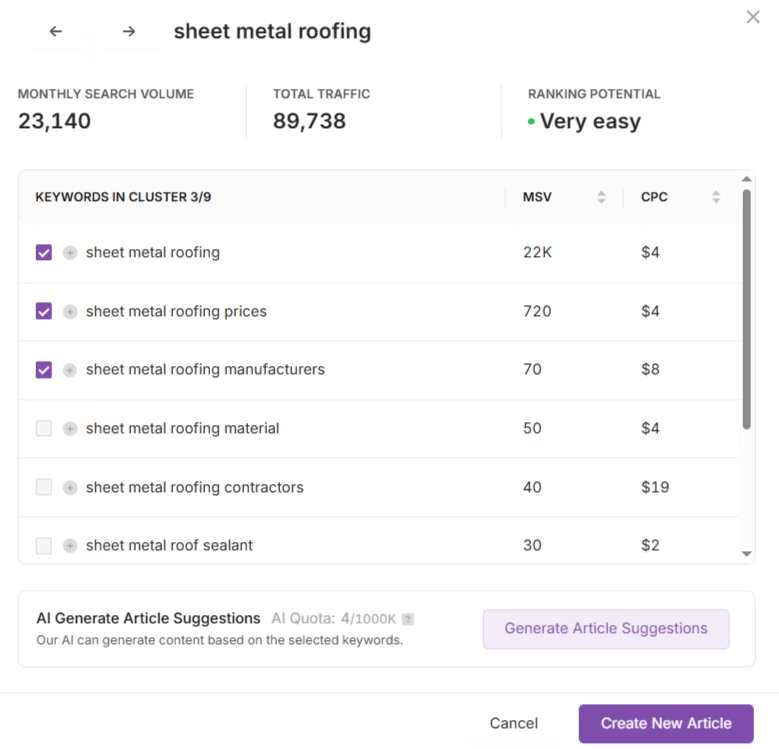
You can export the keyword clusters into a content calendar sheet automatically or share with your team in one click.
This lets you research hundreds of keywords in a matter of minutes, all organized and ready to turn into articles.
Top 5 Bulk Keyword Research Tools in 2025
Now that we’ve explained the bulk keyword research process, it’s time to find the right tool to actually make it happen. There are plenty out there, but some stand out for how easy they make it to find, sort, and use keyword data at scale.
1. Search Atlas
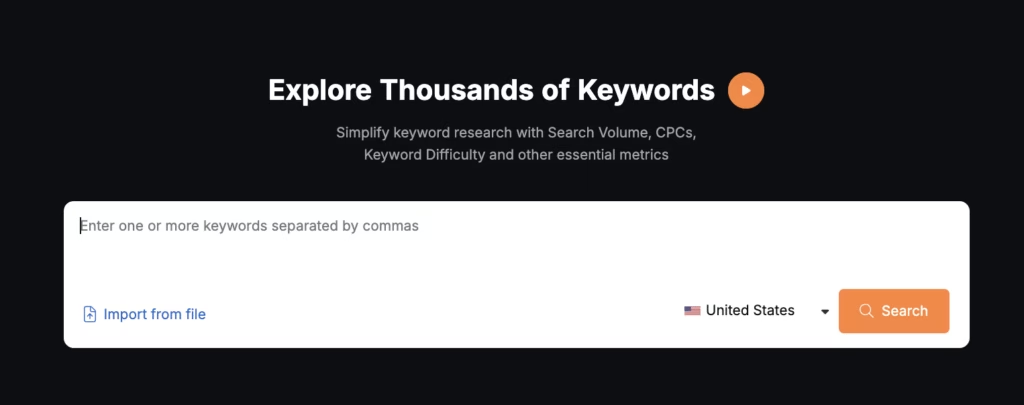
Search Atlas is an all-in-one digital marketing platform with over 40 tools. It helps you handle everything from keyword research and competitor analysis to content strategy, on-page SEO, link building, PPC, and technical audits—all in one streamlined, easy-to-use dashboard.
Search Atlas Popular Features
- Keyword Researcher: Lets you research keywords in bulk.
- Keyword Magic Tool: Helps you get related terms and create easy-to-export lists.
- Keyword Gap: Compares up to 6 domains to find shared and unique keywords as well as gaps you can exploit.
- Keyword Rank Tracker: Highly accurate rank tracker that remains unaffected by Google’s JavaScript update.
- Content Planner: An AI tool that lets you create content calendars and keyword clusters from a seed keyword.
- PPC Keyword Research: Research and analyze PPC keywords and fully automate Google Ads campaigns.
- AI Keyword Optimization: Discover and fix missing keywords and other keyword issues automatically with OTTO SEO.
Search Atlas Limitations
- OTTO needs a bit of setup for bigger sites, but once it’s ready, it delivers better results over time.
Pricing
| Starter plan | Growth plan | Pro plan | |
|---|---|---|---|
| Price | $99/month | $199/month | $399/month |
| Free OTTO activation | 1 | 2 | 4 |
| User seats | 2 | 3 | 5 |
| GSC Insights Keywords per site | Top 10,000 | Top 100,000 | Top 1,000,000 |
| Keyword Research Lookups | 500 | 2,000 | 5,000 |
| Local SEO Search Points | 2,250 | 5,400 | 13,500 |
| Keyword Rank Tracking Projects | 20 | 50 | 1,000 |
| Keyword Rank Tracking Keywords | 1,000 | 2,500 | 5,000 |
Search Atlas Reviews
- G2: 4.8/5 (92)
- Capterra: 4.9/5 (64)
2. Ahrefs
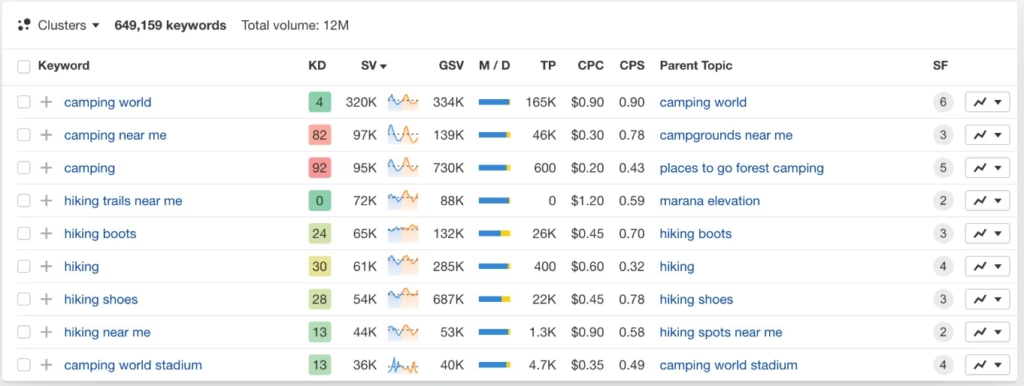
The Ahrefs Keyword Explorer lets you research up to 10,000 keywords at once. It’s a part of a popular platform that gives you mostly SEO insights, although it also includes some solid PPC tools. Ahrefs is more expensive compared to Search Atlas, and it has a different focus.
Ahrefs Popular Features
- Site Explorer: Analyze any domain’s backlinks, organic traffic, and top-ranking pages.
- Keyword Explorer: Get data on volume, difficulty, and ranking opportunities.
- AI Suggestions: Get suggestions for more keywords.
- Clustering: Cluster bulk keywords by topic or parent term.
- Rank Tracker: Monitor your keyword rankings and compare your visibility to your competitors over time.
- PPC & Ads Analysis: Look into their paid ads, including keywords and copy, to improve your own campaigns.
Ahrefs Limitations
- Some users mention limited local SEO capabilities.
Ahrefs Pricing
- Free (AWT): $0 – 5,000 crawl credits
- Starter: $29/month – 5,000 crawl credits and access to Site Explorer, Keywords Explorer, and Site Audit
- Lite: $129/month – 5 projects, 6 months of historical data, 750 tracked keywords, 100,000 crawl credits
- Standard: $249/month – 20 projects, 2 years of historical data, 2,000 tracked keywords, 500,000 crawl credits
- Advanced: $449/month – 50 projects, 5 years of historical data, 5,000 tracked keywords, 1,500,000 crawl credits
Ahrefs Reviews
- G2: 4.5/5 (552)
- Capterra: 4.7/5 (577)
3. Semrush

Semrush is an all-in-one marketing tool used to uncover SEO and PPC insights. It helps you find new keywords, see what your competitors rank for, and identify domains with large keyword footprints. You can build keyword lists to shape your SEO or paid search strategies more effectively.
Semrush Popular Features
- Keyword Overview: Get a complete picture of a keyword with data on search intent, volume, difficulty, CPC, SERP features, and competition.
- Keyword Gap: Compare up to five domains to find shared and missing keywords for new ranking chances.
- Organic Research: Uncover organic keywords your competitors rank for that you haven’t targeted yet.
- Paid Keywords: Check which keywords your competitors are paying for, including cost, volume, and how tough the competition is.
- Bulk Keyword Analysis: Review up to 100 keywords at once and see how they stack up across key metrics.
- Keyword Strategy Builder: Linked to Bulk Keyword Analysis, this tool helps you turn your data into a content plan.
Semrush Limitations
- Some reviewers mention that analyzing up to 100 keywords at once is not enough for them.
Semrush Pricing
- Free: $0 – 10 keyword searches per day, up to 10 domains per day, track 10 keywords, crawl up to 100 URLs, monitor local listings
- Pro: $139.95/month – 5 projects, 500 tracked keywords, 10,000 results per report
- Guru: $249.95/month – 15 projects, 1,500 tracked keywords, 30,000 results per report, access to historical data, content marketing platform, Looker Studio Integration
- Business: $449.95/month – 40 projects, 5,000 tracked keywords, 50,000 results per report, access to API, and extended limits.
Semrush reviews
- G2: 4.5/5 (2,521)
- Capterra: 4.6/5 (2,280)
4. SpyFu
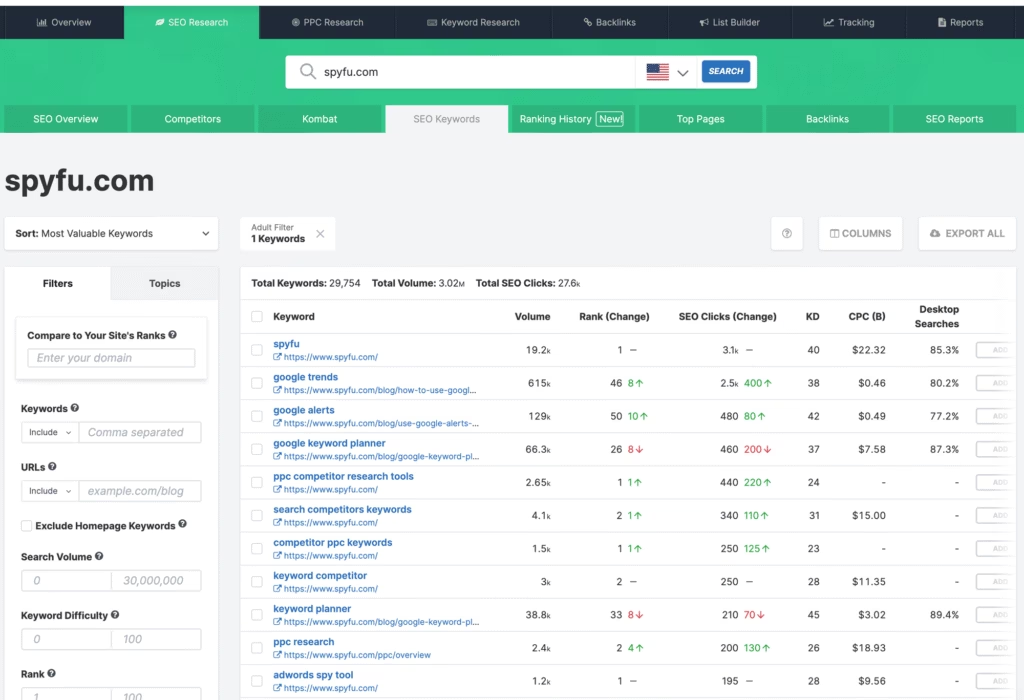
SpyFu offers bulk keyword research for PPC and SEO purposes, and gives you historical data spanning over 15 years. It can analyze up to 1,000 keywords at once and automatically group the keywords into clusters.
SpyFu Popular Features
- Bulk Keyword Research Tool: Research keywords in bulk and handle large lists, which you can easily group and export.
- Google Ads Keyword Spy: Enter a competitor and download their complete PPC keyword list with data on cost.
- SEO Competitor Keyword Download: Download any competitor’s SEO keywords as a list. Rankings and estimated clicks included.
- SEO Competitor Tracker: Monitor ranking shifts, content updates, and new competitors.
- Keyword Overview: Get insights into SEO and PPC keywords in a single plan.
- Related Keywords: Find related keywords organized by search type or other metrics.
SpyFu Limitations
- According to some reviews, insights on niche markets can be limited.
SpyFu Pricing
- Basic Plan: $39/month – Access up to 10,000 row search results and 10,000 row data exports, 6 months of historical data, 250 sales leads, and 5,000 weekly tracked keyword rankings. Includes 1 user seat (add more for $15 each).
- Pro Plan: $79/month – Enjoy unlimited search results, unlimited data exports, unlimited domain overview PDFs, over 10 years of historical data, 500 sales leads, 15,000 weekly tracked keyword rankings, and API access. Includes 1 user seat (additional seats $30 each).
- RivalFlow: $39/month – Use AI to enhance content and close ranking gaps.
SpyFu Reviews
- G2: 4.6/5 (512)
- Capterra: 4.5/5 (144)
5. Serpstat
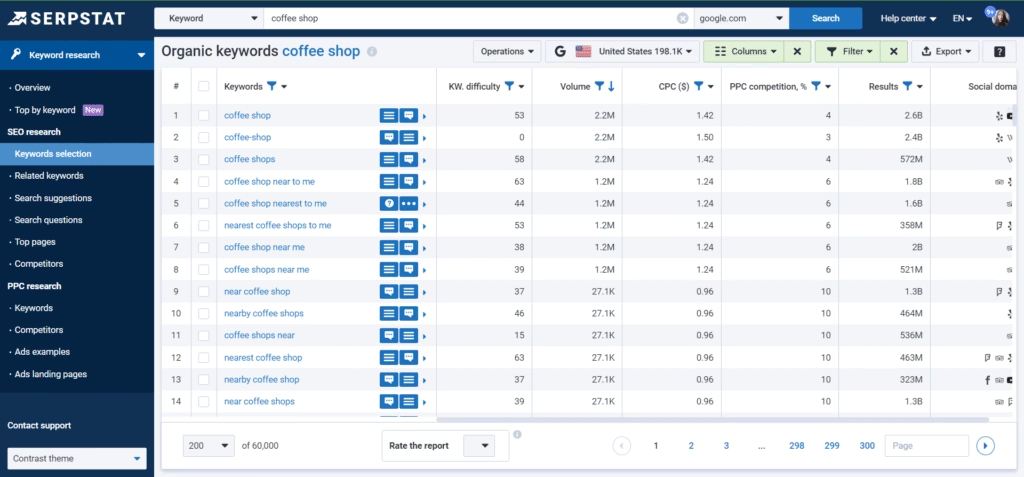
Serpstat is an SEO platform with a bulk keyword research tool that gives you search volume data for up to 100,000 words at once. It also has competitor research tools and PPC analysis features. It’s known to be one of the more affordable SEO tools.
Serpstat Popular Features
- Batch Analysis: Analyze several domains at once to see their traffic, SEO and PPC keywords, and backlink data.
- Keyword Gap Analysis: Compare competitor keyword lists to find overlaps and missed opportunities to improve your SEO.
- Keyword Niche Finder: Discover related keywords and popular search terms to strengthen your content and SEO strategy.
- Top Pages Analysis: Find out which competitor pages perform best and what’s driving their traffic.
- PPC Analysis: Review competitors’ paid campaigns, including keywords, ad creatives, landing pages, and overall performance.
Serpstat Limitations
- There have been mentions of occasional inaccuracies regarding the keyword difficulty metric.
Serpstat Pricing
- Individual: $69/month – For freelancers and beginners; includes 5 projects, 100 searches/day, 10,000 position checks, 30,000 pages audited, 50,000 export rows, and core features.
- Team: $129/month – For agencies and growing teams; offers unlimited projects, 500 searches/day, 50,000 position checks, 150,000 pages audited, 250,000 export rows, plus extended features.
- Agency: $499/month – For large agencies and businesses; includes unlimited projects, 5,000 searches/day, 500,000 position checks/month, 1,500,000 pages audited/month, 2,500,000 export rows/month, all Team Features and more.
Serpstat Reviews
- G2: 4.6/5 (462)
- Capterra: 4.7/5 (169)
Try Bulk Keyword Research Powered by AI
Want to bring in more of the right traffic and actually turn it into results? It begins with understanding what people are searching for, at scale.
With Search Atlas’s Content Planner, you can automatically uncover top keywords, group them into clusters, and build a full content plan in minutes. OTTO SEO takes it even further by automating keyword tasks that usually take hours
And our keyword research tools let you discover SEO and PPC insights with speed and precision.
Try Search Atlas FREE for 7 days and enjoy automation that will help your agency grow.









